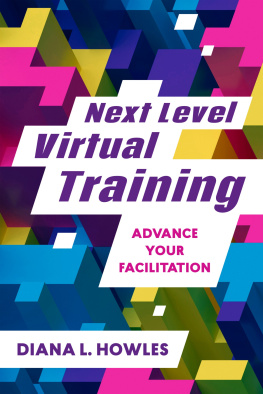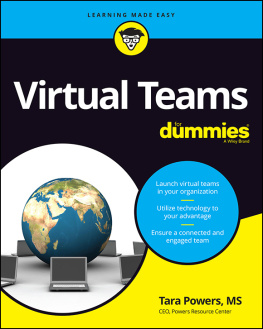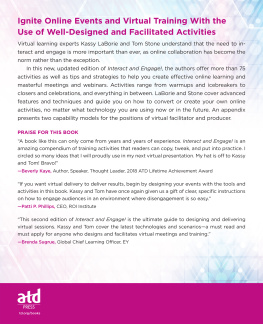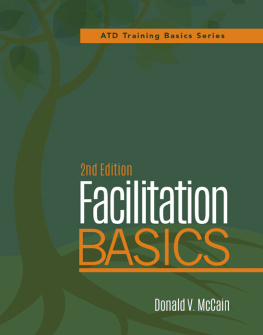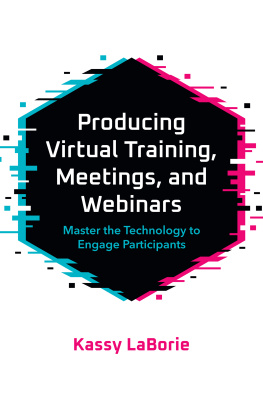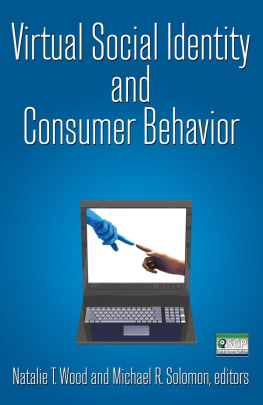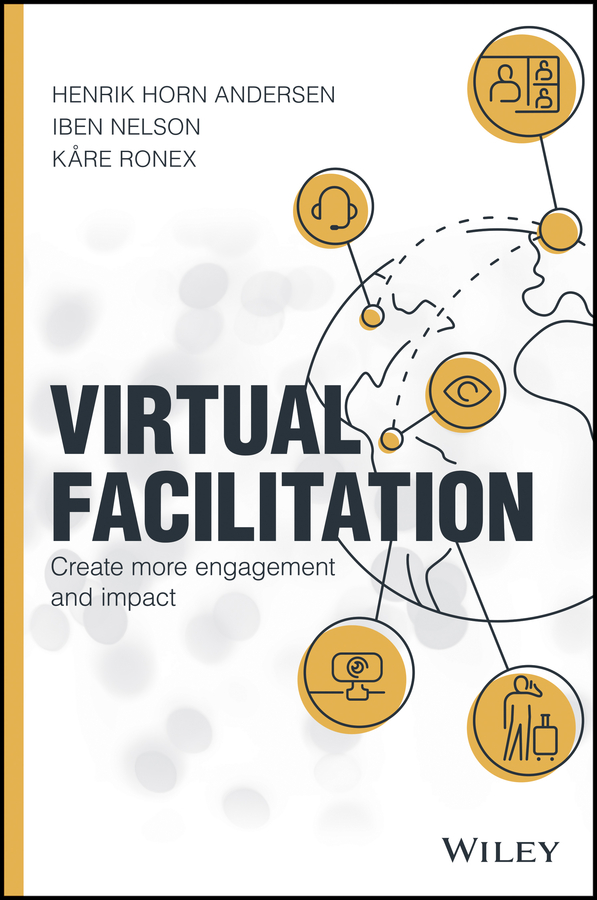
Table of Contents
List of Illustrations
- Chapter 1
- Chapter 2
- Chapter 3
- Chapter 4
- Chapter 6
- Chapter 7
- Chapter 8
- Chapter 9
- Chapter 10
- Chapter 11
- Chapter 12
- Chapter 14
- Chapter 15
- Chapter 16
- Chapter 17
- Chapter 18
- Chapter 20
- Chapter 23
- Chapter 26
Guide
Pages
Virtual Facilitation
Create More Engagement and Impact
Henrik Horn Andersen
Iben Nelson
Kre Ronex

This edition first published [2021]
2021 Implement Consulting Group
 | This work was produced in collaboration with Write Business Results Limited. For more information on Write Business Results business book, blog, and podcast services, please visit their website: or call us on 020 3752 7057. |
Registered office
John Wiley & Sons Ltd, The Atrium, Southern Gate, Chichester, West Sussex, PO19 8SQ, United Kingdom
For details of our global editorial offices, for customer services and for information about how to apply for permission to reuse the copyright material in this book please see our website at www.wiley.com.
All rights reserved. No part of this publication may be reproduced, stored in a retrieval system, or transmitted, in any form or by any means, electronic, mechanical, photocopying, recording or otherwise, except as permitted by the UK Copyright, Designs and Patents Act 1988, without the prior permission of the publisher.
Wiley publishes in a variety of print and electronic formats and by print-on-demand. Some material included with standard print versions of this book may not be included in e-books or in print-on-demand. If this book refers to media such as a CD or DVD that is not included in the version you purchased, you may download this material at http://booksupport.wiley.com. For more information about Wiley products, visit www.wiley.com.
Designations used by companies to distinguish their products are often claimed as trademarks. All brand names and product names used in this book are trade names, service marks, trademarks or registered trademarks of their respective owners. The publisher is not associated with any product or vendor mentioned in this book.
Limit of Liability/Disclaimer of Warranty: While the publisher and author have used their best efforts in preparing this book, they make no representations or warranties with respect to the accuracy or completeness of the contents of this book and specifically disclaim any implied warranties of merchantability or fitness for a particular purpose. It is sold on the understanding that the publisher is not engaged in rendering professional services and neither the publisher nor the author shall be liable for damages arising herefrom. If professional advice or other expert assistance is required, the services of a competent professional should be sought.
Library of Congress Cataloging-in-Publication Data
Names: Andersen, Henrik Horn, author. | Nelson, Iben, author. | Ronex, Kare, author.
Title: Virtual facilitation : create more engagement and impact / Henrik Horn Andersen, Iben Nelson, Kare Ronex.
Description: Chichester, West Sussex, United Kingdom : John Wiley & Sons, 2021. | Includes index.
Identifiers: LCCN 2020041520 (print) | LCCN 2020041521 (ebook) | ISBN 9781119765318 (cloth) | ISBN 9781119770572 (adobe pdf) | ISBN 9781119770565 (epub)
Subjects: LCSH: Virtual reality in management. | Group facilitation. | Business meetings. | Virtual work teams. | EmployeesTraining ofComputer-assisted instruction.
Classification: LCC HD30.2122 .A53 2021 (print) | LCC HD30.2122 (ebook) | DDC 658/.0568--dc23
LC record available at https://lccn.loc.gov/2020041520
LC ebook record available at https://lccn.loc.gov/2020041521
Cover Design: Wiley
Cover Image: Implement Consulting Group
Background: Eakachai Leesin/EyeEm/Getty Images
Foreword
In March 2020 London Business School, as many other organisations across the world, faced a severe challenge due to the Covid-19 pandemic. A large part of our business (executive education) stopped abruptly, as people were simply unwilling or unable to fly to London. The crisis required us to rethink many fundamental aspects of our business our view on teaching and learning, on how we collaborate with others, on what exactly people value from a business education and to do it extremely quickly.
Normally London Business School is a melting pot of bright people, joining MSc and MBA programmes, seeking a state-of-the-art education, and building networks with other like-minded people from all over the world. But in March, with the Covid-19 situation escalating across the world, it was clear that we couldn't deliver on that value proposition in the same way as before.
Our first priority was to ensure that our Masters degree students could continue learning, take the necessary exams, and graduate on the agreed timetable. Which of course meant moving all teaching online. At first, there was scepticism and resistance to this move, but we persevered and it quickly became clear that classroom learning can be recreated quite effectively in Zoom, and sometimes even for the better. Student ratings and exam grades suggest that this wholesale shift to online teaching has been a success.
To be sure, I still have some reservations about online learning. One problem is lower levels of student engagement. My experience in the classroom is around 70% fully engaged and participating in the case study discussions, 20% disengaged (sitting at the back, probably on Facebook) and 10% absent. The comparable numbers for online classes is around 40% engaged, 30% disengaged, 30% absent (and hopefully watching the recording of the class later). So while there is still a decent level of learning achieved by everyone, I think the number who get full value out of the session is much lower. Another challenge is you need a different mindset and focus as a teacher, since you don't get the same quality of feedback from the students. In a classroom setting you often adapt in the moment and you can speed up or slow down, depending on the body language and the questions. But teaching over Zoom you don't get that same quality of insight into what the students are thinking, so there is little scope for deviation.
These reservations aside, online teaching actually works pretty well, at least in terms of building cognitive understanding in the students. But the relational and behavioural parts of learning are much more challenging in a virtual setting they require more planning and deliberate design, which this book clearly demonstrates and provides inspiration for.
If the teaching part had been the only challenge back in March it wouldn't have been so bad. But of course London Business School is much more than just an educational institution we also see ourselves as a platform for developing and sharing new business insights on a global basis. So in thinking about ways to make the best of the challenging circumstances, we launched a free live webinar series, initially called Leading Through a Pandemic through to May, and then shifting to Beyond the Crisis from June onwards. In total we had 26 webinars, roughly two per week, on topics ranging from macro-economics through strategy to personal resilience. I hosted the series, and each webinar featured one or two faculty, applying their research insights to the challenges facing businesses in that period of lockdown. The reception was very positive between 1,500 and 5,000 registered attendees for each webinar, and around 15,000 unique attendees in total. Some were LBS alumni and students, but many were executives who had never interacted with us before, so the PR benefits to the School were huge. To gain additional value out of these webinars, we then pulled them together with some additional pre-recorded materials, readings and assignments, to create an online course Building Organisational Resilience which we made available for purchase even before lockdown was over.
Next page

